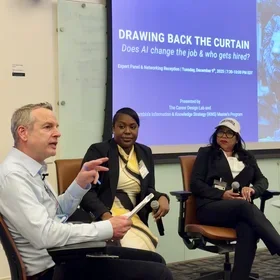Written by Shana Childs
The Columbia M.S. in Political Analytics program is tailored to recent graduates from a range of backgrounds—from political science or public administration programs to mid-career working professionals who aspire to or wish to advance in a data-oriented career in all levels of government or NGOs, think tanks, and organizations for research, consulting, or lobbying. It is designed to fill an important role in the rapidly developing field of data analytics as it is applied to politics and public policy, allowing students who are interested in new approaches to data analytics—such as machine learning—to integrate those interests with a politics or policy focus, belying the idea that legal training is the preferred pathway into those fields.
Columbia Political Analytics graduates are prepared to excel in a range of careers that require expertise in critical thinking, data analysis, and communication—skills that they acquire and build during their studies. Post-graduation career pathways may include—but are not limited to—political campaign management, consulting, lobbying, issue advocacy, public and governmental affairs, policy analysis, political fundraising, and media. This article examines a few career options graduates might pursue that would be applicable to the skills and knowledge they would acquire in the program.
Consulting: Political campaigns and fundraising, advocacy campaigns, corporations, nonprofits, and NGOs need strategic advice and solutions backed by reliable data. That’s where consultants come in. Consulting is a term that broadly refers to specialized advice provided by external organizations. The two major categories most relevant to political analytics are strategy and management and economic consulting. Strategic consultants provide clients—which can range from political candidates to nonprofit organizations—with expert advice in areas such as issue advocacy, research, media training, grassroots engagement, advertising, and crisis management. Consultants can operate independently or work for full-service or smaller boutique firms.
Lobbying: Lobbyists represent the interests of their clients or employers in governmental affairs. The primary objective? To persuade government officials to act on legislation, policies, and regulations that best benefit their clients. For example, lobbyists representing energy and pharmaceutical companies are active participants in the rulemaking process of regulations that affect the company’s operations and bottom lines. The job of the lobbyist may include monitoring the activities and policies of government officials and agencies, meeting with staff members, and participating in public hearings. Lobbyists are required to register their profession according to state and federal laws.
Media: Political polling, modeling, and the scrutiny of election outcomes have increased the demand for sophisticated and precise mathematical modeling and analysis. All are relevant tools for journalists, who play an important role in producing accurate and clear news so that the electorate and others, such as lawmakers, can understand and take action on key issues based on that reporting. By considering a variety of sources, journalists verify facts and produce news with the goal of informing their readers and viewers—and holding those in power accountable. Deep knowledge of politics and quantitative and qualitative methods prepares journalists to deeply engage with data to find important stories that may otherwise go overlooked or distorted by special interests. Data journalism is a growing subgenre that will require more reporters, analysts, editors, producers, and news directors who can communicate effectively about political behavior and dynamics.
Political Analytics students may access comprehensive career guides through Columbia SPS’s subscription to Firsthand.


